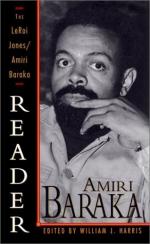|
This section contains 1,606 words (approx. 6 pages at 300 words per page) |

|
SOURCE: '"Slave Ship': Vision Meets Form," in Baraka: The Renegade and the Mask, Yale University Press, 1976, pp. 243-54.
In the excerpt below, Benston explores Baraka's use of music throughout his work, especially in "Slave Ship. "
In his drama Baraka has constantly used music. In "Jello," Rochester dances soul-steps while robbing Bennie. In A Recent Killing, dances and songs help fill empty dramatic spaces and serve as entertainment. In "Home on the Range," music becomes a metaphor for judgment and apocalypse in the wild "nigger" party. The most interesting use of music before "Slave Ship" is in "Dutchman," where Lula's dance, Clay's discussion of the blues and Charlie Parker, and the Negro conductor's final soft-shoe are crucial theatrical and thematic elements of the play.
It is with "Slave Ship," however, that Baraka elevates music to the dual position of central metaphor and primary theatrical vehicle. … The drama of...
|
This section contains 1,606 words (approx. 6 pages at 300 words per page) |

|


